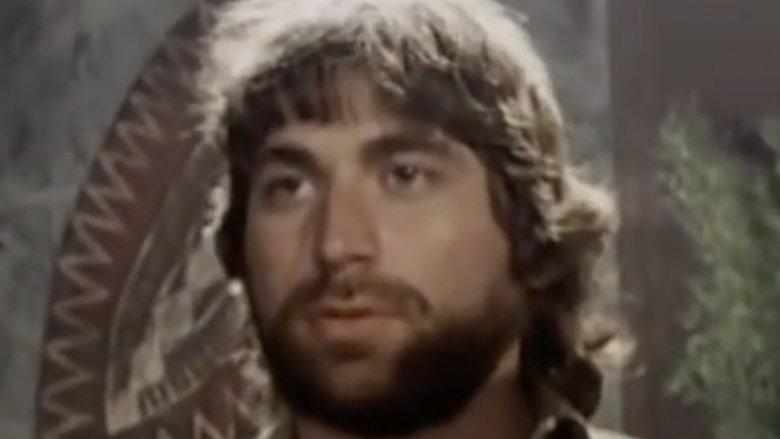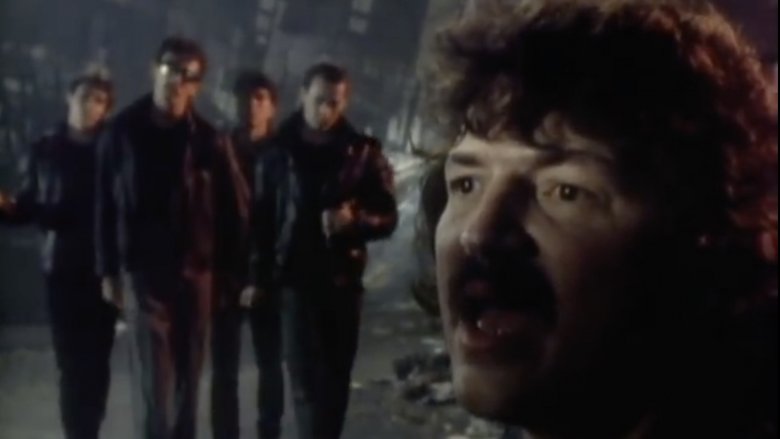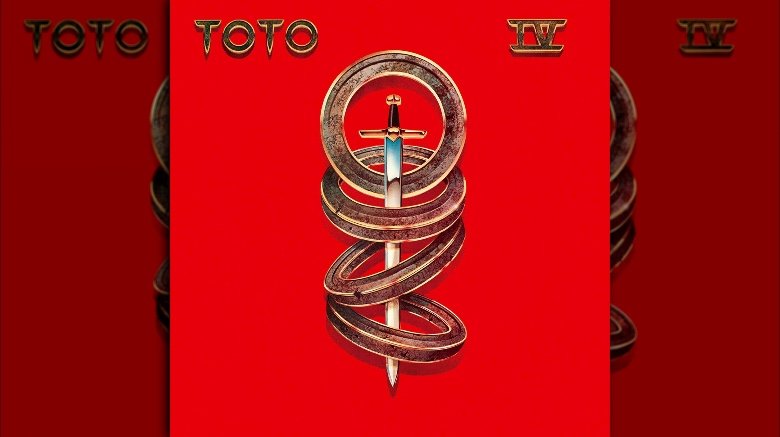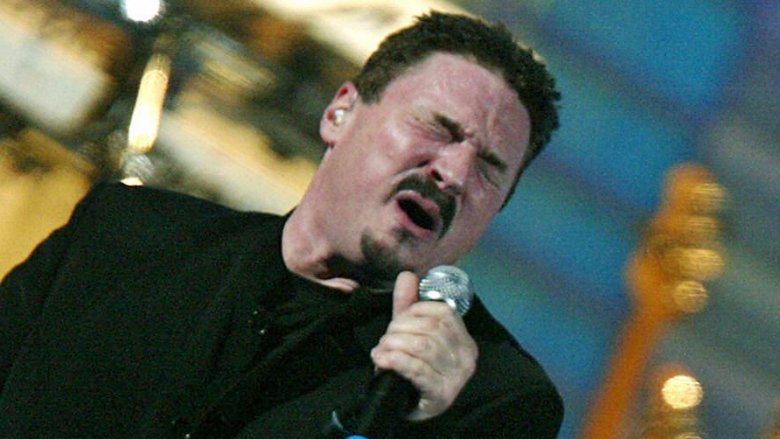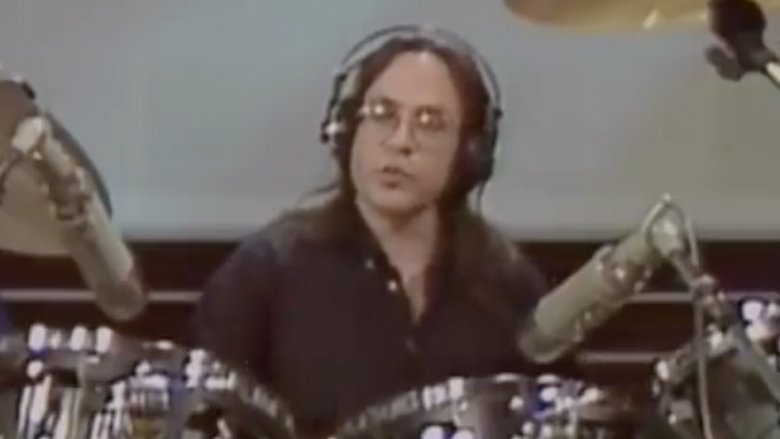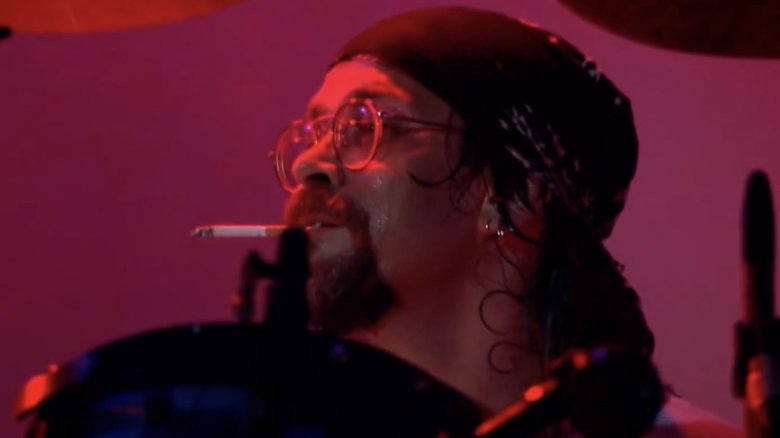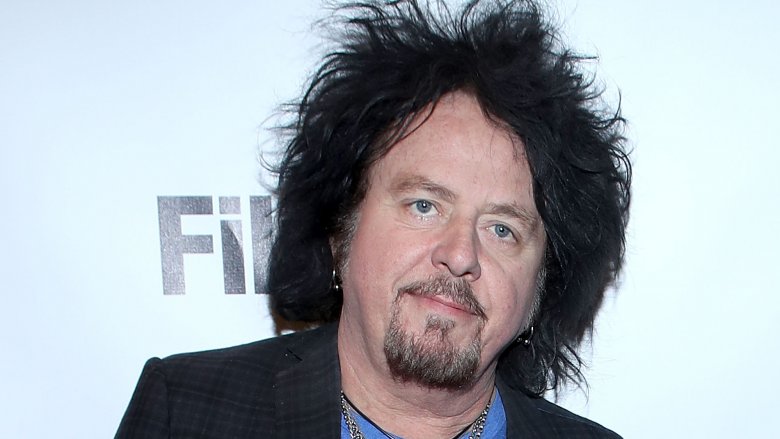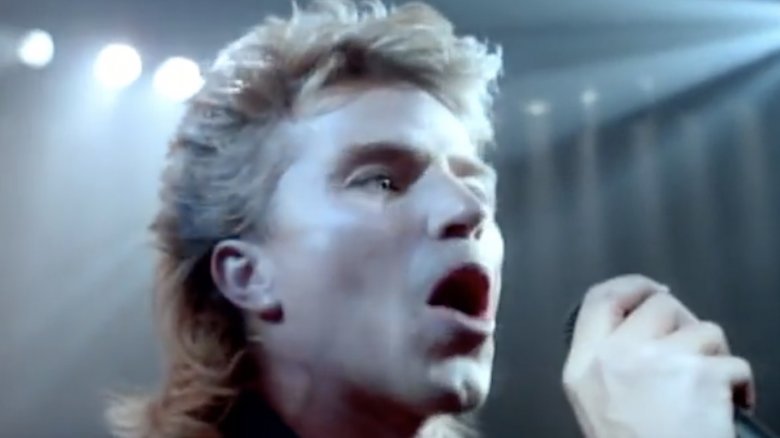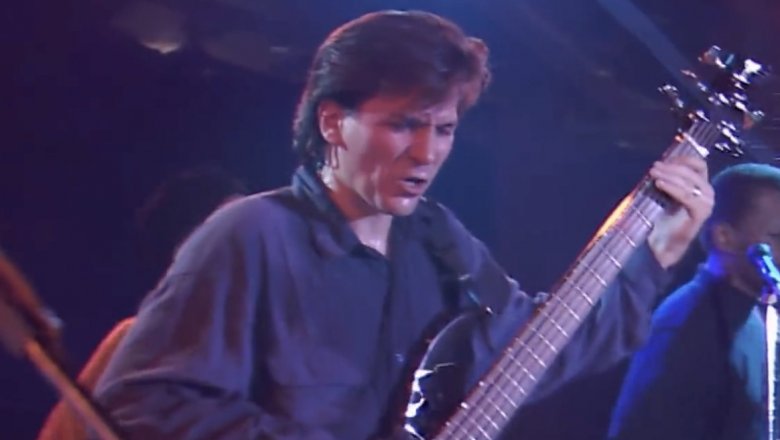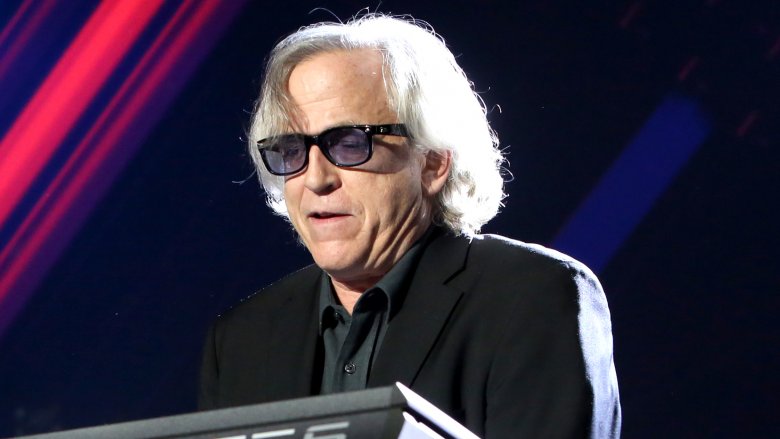The Tragic Real Life Story Of Toto
Toto may not be the most legendary rock band, but their story is unlike that of any other. They're probably the most technically proficient and certainly one of the most versatile bands to ever form, and that's because the group was formed by a bunch of veteran studio musicians. All told, members Jeff Porcaro, Steve Porcaro, David Paitch, Steve Lukather, and the rest played on thousands of well-known recordings, before they decided to join forces and make their own music. It was a solid career decision — Toto went on to sell millions of records and generate a slew of songs still heard on classic rock and lite FM stations 30-odd years later: the hard-rocking "Hold the Line," the soul-tinged "Georgy Porgy," the oft-covered "Africa," and the shuffling "Rosanna." Thanks to that last one, Toto won Record of the Year at the 1983 Grammy Awards, along with Album of the Year for its fourth album, Toto IV.
Toto briefly ruled rock — and its sunshine days were just as brief. The rest of the band's history is riddled with discord and tragedy. Here's the long, strange, and sad story of Toto.
A band of brothers means a band of fighters
To say that a close friend is "like a brother" is one of the most inaccurate expressions in the English language. It's understood to mean a tight, healthy relationship, but it pays no mind to how brothers actually are with each other, especially when they're young: Brothers fight, and brothers fight hard. It's almost as contentious a relationship as that of bandmates, and, as any episode of Behind the Music or a rock band biopic can tell you, band members seem to be at each other's throats more often than not, fighting over whose songs to do, artistic direction, and such. But when you mix a tricky and prickly brother dynamic with band politics, it's remarkable anything gets done and recording sessions don't descend into a knock-down, drag-out wrestling match.
Drummer Jeff Porcaro co-founded Toto, and quickly asked his brother, keyboardist Steve Porcaro, to join in. After original bassist David Hungate left the group in 1982, another one of those Porcaros, Mike, jumped from occasional Toto cellist to full-time Toto bassist. That added up to a bubbling cauldron overflowing with searing hot animosity and resentment. "I felt undervalued," Steve Porcaro told Classic Rock (via Louder) regarding his early years of Toto, adding, "Jeff and I were always at each other's throats. Mike got along with both of us. But Jeff and me really bumped heads." He recalled Jeff Porcaro getting frustrated if his sibling couldn't reach his perfectionist standards, but "there was definitely some brother s*** going down, because I'd hear him singing my praises when I wasn't around." (Which begs the questions: How did he hear things if he wasn't there? Was there a very different kind of bugging his brother going on?)
Everybody hates Toto
There are a handful of bands which achieve objective, extreme success, selling tens of millions of records and winning music industry accolades... and yet everybody seems to hate them because they aren't as hip or edgy as some of their peers. Groups of this nature include Hootie and the Blowfish, Nickelback, and, conveniently for this article, Toto.
The band's 1982 album Toto IV spawned two of the most popular radio hits of all time in "Rosanna" and "Africa," which went to #2 and #1 on the Billboard Hot 100, respectively, and in 1983 the Academy of Recording Arts and Sciences bestowed multiple Grammy Awards on the very popular band and its very popular music, including Album of the Year, Producer of the Year, and Record of the Year (for "Rosanna"). It seemed like the Grammys got it right that time, but apparently not, because Toto still couldn't get much respect. Critics already couldn't stand the band; Rolling Stone (via People) labeled Toto IV "about as real as a Velveeta-orange polyester leisure suit," while Robert Hilburn of the Los Angeles Times claimed a "disheartening lack of depth or daring in the group's music." Toto wryly thanked Hilburn in one of its Grammy acceptance speeches. Ouch. "Critics are just fools with no credentials or credibility," Toto's David Paich told People, with drummer Jeff Porcaro adding, "They don't like us, and they probably never will." Sensing danger, the band even said no to a big rock 'n' roll milestone. "We're the only band in history to turn down the cover of Rolling Stone," Steve Lukather later told the St. Louis Post-Dispatch. "We knew they were going to do a hatchet job on us." At the end of the day, Toto was one of the biggest bands in the world, and at their commercial peak, yet the members of the band couldn't even enjoy it.
Cocaine blues for Bobby Kimball
Like the Beatles, Kiss, or the Spice Girls, Toto split lead vocals duties among its members. Steve Lukather, David Paich, and Steve Porcaro all took turns behind the microphone in addition to their regular instrumental duties, but Bobby Kimball served as the band's primary singer for its first four albums in the late '70s and early '80s. Those are his powerful pipes on "Hold the Line" and "Rosanna," for example.
Additionally, the late '70s and early '80s, perhaps more so than any other era in rock 'n' roll, were a time of widespread cocaine use. Band member Steve Lukather told Classic Rock (via Louder) that while Toto dipped into the white stuff back in the day, it wasn't that big a deal. "We were not the only band that did blow. We weren't as bad as most. But thanks to Mr. Kimball, that became like our badge of honor." In other words, Kimball was doing too much coke — so much so that Toto's Steve Porcaro says it ruined his voice. "The bottom line was Bobby couldn't sing. I stayed up all night. We all did. The next day my throat would be like ribbons," Poracaro said. "But I didn't have to sing. Bobby had to, and he just wasn't delivering." And so, in 1983, right after its peak of commercial success, the members of Toto that weren't Bobby Kimball elected to fire Bobby Kimball, right around the same time that Kimball stood trial for a 1981 incident in which he allegedly sold four ounces of cocaine to an undercover cop.
The tragic death of Jeff Porcaro
It's a rare band in which the leader is the drummer, seeing as how they're stuck behind a mass of snares and hi-hats way in the back of the stage. Fleetwood Mac was definitely Mick Fleetwood's baby, latter-day Genesis was sticksman Phil Collins' vehicle, and coming in a respectable third on that short list, Toto was Jeff Porcaro's band all the way. He formed the band in the first place, and bandmate Steve Lukather labeled him Toto's "figurehead." It was understandably devastating to the band when Porcaro suddenly died at the young age of just 38 in August 1992.
What caused a outwardly-healthy seeming, relatively young guy to drop dead is a bizarre amalgam of factors ... and the story changes a bit, depending on who's talking. According to a story published in the Los Angeles Times on August 7, 1992, Porcaro was working in his yard in the San Fernando Valley, spraying plants with pesticide, when he fell ill. By the time emergency workers arrived, he wasn't breathing, had no pulse, and his heart had stopped. After briefly reviving him, authorities transported Porcaro to a hospital where he was pronounced dead. A Los Angeles County Coroner spokesman (and some doctors who treated Porcaro) attributed the death to a heart attack caused by an allergic reaction to inhaled pesticide spray. But...
What really killed Jeff Porcaro?
When the Los Angeles County Coroner released its official report on Porcaro a few weeks later, it ruled Porcaro's cause of death to be occlusive coronary artery disease, in layman's terms a hardening of the arteries, brought on by long-term cocaine use. Tests found no trace of pesticide in Porcaro's system, but they did reveal traces of cocaine, along with benzoylecgonine, a cocaine byproduct.
However, Toto member Steve Lukather wasn't happy with this conclusion at all, and disavowed the coroner's report as well as the news organizations that went ahead and published it. "It was irresponsible journalism," Lukather told Classic Rock (via Louder). "They found one one-hundredth of a microgram of cocaine in Jeff's blood. That's like two crystals on a f***ing matchstick. That ain't gonna give somebody a heart attack, believe me. The rest of us were doing a hundred times more than that and we all lived to tell the tale." Lukather claims that Porcaro's premature death was brought about by a long-standing heart condition and a smoking habit, which bizarrely helped that toxic pesticide find its way into the drummer's bloodstream. "He was probably smoking a cigarette or a joint. He didn't have gloves on. That's how the chemicals got into his skin."
Toto had to break up for personal (and sad) reasons
While Toto topped the charts and dominated both the Grammys and rock radio in the early '80s, sadly the band subsequently drifted into semi-obscurity thereafter, the fate of so many artists who were once on top of the world. The music industry and music consumers are fickle, loving you one minute, totally over you the next.
But that doesn't mean the group disbanded. After the hugely successful Toto IV, the band released eight studio albums (not counting its full-length soundtrack to David Lynch's ill-fated Dune) and four live albums, a new one arriving in stores every couple of years or so, and well into the 2000s. Toto stayed a going concern, an intact, often touring band for more than 30 years, all the way until 2008, which marked the first time the band ever officially disbanded. But by that point, Steve Lukather was the only original member left, but as he later told Classic Rock (via Louder), neither musical nor personnel reasons caused the split. He needed to end the band to deal with a slew of personal issues. "I was drinking myself to death, I was losing my marriage, my mother was dying," he said. "It was a bad time. I needed to get myself together or I was going to end up killing myself." Happily, Lukather says, he turned things around—he quit drinking, starting going to therapy, and in the process, "exorcised some demons."
Toto's replacement lead singer died
It turns out that Bobby Kimball's distinctive vocal stylings were a key part of Toto's sound ... and appeal. After he was forced out of the band, Toto's fortunes took a steep downturn. While Toto IV peaked at #4 on the Billboard album chart, won some Grammys, and went multi-platinum, the group's apparently not-so-highly-anticipated 1984 follow-up Isolation stalled at #42 (and only went gold). It's tough to replace the lead singer of an established band—Sammy Hagar of Van Halen and Brian Johnson ofAC/DC are about the only ones who succeeded—and it was a tall order for Kimball's immediate successor, Dennis "Fergie" Frederiksen.
A veteran singer with the likes of rock bands like Trillion, Survivor, and La Roux, he certainly had the chops and experience to roll with Toto, but it just didn't work out—he left the band after Isolation, replaced by singer Joseph Williams. Sadly, in June 2010, Frederiksen announced that he'd been diagnosed with an inoperable form of cancer. Less than four years later, the former Toto singer died at age 62.
The death of another Porcaro brother
Some of the biggest and most important acts in rock history are sibling acts—consider the Beach Boys with its Wilson brothers, Heart with its Wilson sisters (no relation), and those golden-haired angel boys in Hanson. Toto was a family act, too: In 1982, a third Porcaro bro, Mike Porcaro, joined drummer Jeff Porcaro and keyboardist Steve Porcaro in the band. While he'd contributed his cello skills on a few Toto IV tracks, he became an official member of the group in 1982 after the departure of original bass player David Hungate. And so he stayed, playing bass for Toto on record and on stage all the way until 2007, when, according to Louder, he tragically had to quit the band because of serious health issues. After noticing a numbness in his fingers while playing the bass, Porcaro sought medical treatment, and doctors diagnosed him with amyotrophic lateral sclerosis, or ALS, or "Lou Gehrig's disease," a devastating and ultimately fatal degenerative neural condition that slowly robs the body of its abilities to speak, eat, and breathe. It's a seriously horrible diagnosis. After bravely coping with ALS for eight years, Mike Porcaro died in 2015 at the age of 59.
Good news and bad news for Steve Porcaro's tumor
Toto has been a going concern for more than 40 years. That's a long time, and with it come changes—band members arrive, band members leave, and people formerly or currently associated with the band fall prey to the predatory nature of time. An inordinate number of Toto's musicians have died—Jeff Porcaro, Mike Porcaro, Fergie Frederiksen—while Steve Porcaro managed to avoid the Grim Reaper for now. "Steve had a tumor removed in his brain," Steve Lukather told Classic Rock (via Louder). "It was benign, thank God." That's not to say this serious medical scare left him completely unscathed. "He had a brain tumor," sometime Toto singer Bobby Kimball told Metal-Rules in 2013, "and when they took the tumor out he went deaf in his left ear." While it's certainly wonderful that Porcaro survived the ordeal of a brain tumor and the surgery to remove said brain tumor, it's also tragic that a professional musician—a man who makes his living judging and creating the nuances of sound—would be partially robbed of the gift of hearing.
Toto only did a comeback tour because they had to
Like so many other bands before them, the classic lineup of Toto (or the still-living ones at least)—Steve Lukather, David Paich, Steve Porcaro, David Hungate, along with other associates—convened for a tour in 2015 ostensibly in support of Toto XIV, its first album in nine years. But the real reason the band got back out there is a lot more depressing: They had no choice.
In 2008, Toto suspected that its label, Sony, owed unpaid royalties for digital downloads. An auditor confirmed that notion, and in 2010, the band sued Sony, seeking more than $600,000 in damages. Because it's all about the Benjamins and the music industry eats its own, in addition to filing (unsuccessfully) for a dismissal of the suit, Sony then countersued, wanting $500,000 from Toto which it says it overpaid in royalties over the years. Unfortunately for the band, in 2014, a judge ruled that the label didn't owe them any money.
If Toto needed cash before it sued Sony, it certainly needed it after it lost an expensive, years-long legal battle. The group recorded Toto XIV, an act "born out of litigation," Lukather told Smashing Interviews Magazine. "When we came through the litigation, all the s*** left over from management that screwed us and all the other negatives, we decided to turn the negative into a positive. When we put our minds to do the record, we said that we had to make as good a record as we possibly could with all the tools and all the talent and all the experience we've had and not just phone it in for a check." That's the spirit.
